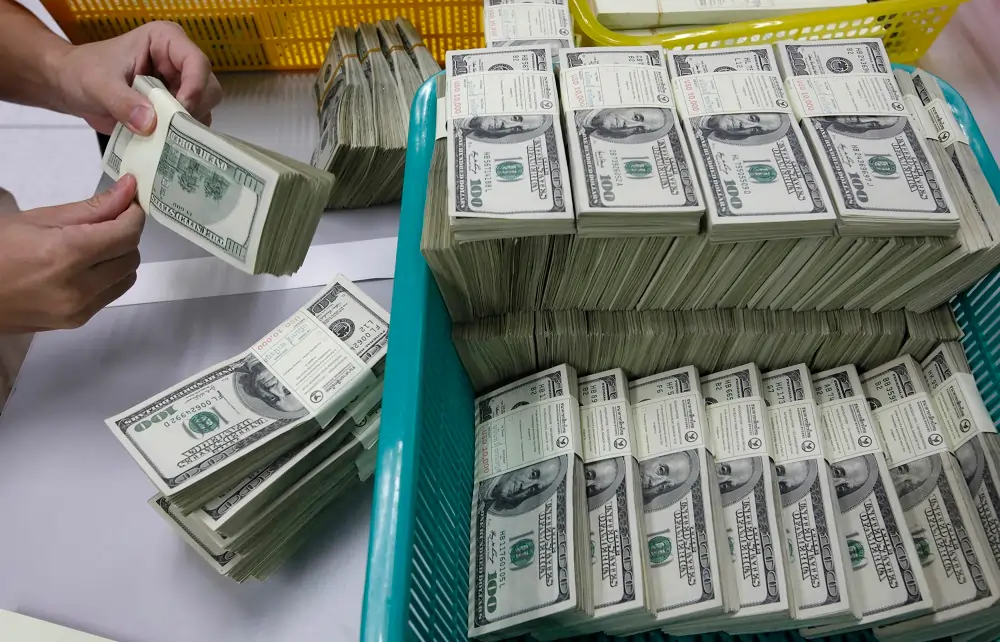
NEW YORK (Reuters) -The dollar slipped to a five-month low against the euro and a basket of currencies on Wednesday on expectations the Federal Reserve could soon cut U.S. interest rates.
But with many traders out for holidays volumes are likely to remain muted until the New Year, and price moves are exaggerated by low liquidity.
The dollar index, which measures the U.S. currency against six others, fell 0.48% to 100.98, the lowest since July 27. The index is on course for a 2.45% drop in 2023 after two years of strong gains driven by the anticipation of interest rate hikes by the Fed followed by its actual rate increases to battle inflation.
The Fed is now viewed as being dovish relative to other major central banks. Pricing for a rate cut in March increased after Fed Chairman Jerome Powell was unexpectedly dovish at the U.S. central bank’s December meeting, when policymakers projected 75 basis points in easing in 2024.
Other central banks including the European Central Bank (ECB) have maintained a higher for longer stance. The Bank of Japan, meanwhile, has indicated that it is closer to ending its negative rate policy even as it also maintains it is in no rush to make a change.
“Japan is going to finally come off of their extreme low policy within the next couple of months at least and also the ECB is sounding a little more hawkish than the Fed’s newfound dovishness,” said Lou Brien, market strategist at DRW Trading in Chicago.
Key to the U.S. outlook will be what prompts rate cuts. If inflation falls much faster than the Fed’s benchmark rate it can tighten monetary conditions more than Fed policymakers intend.
“If the Fed cuts rates because inflation has come so far down that they don’t want policy to unintentionally tighten … then that’s probably a good scenario,” said Brien.
If they cut because of a weakening economy, however, “then the history is kind of harsh” for the economy and the stock market, he added. “The motivation behind the rate cuts is still unknown and is going to be the most important factor.”
The euro rose 0.54% to $1.1102, the highest since July 27. The single currency is on track to gain 3.61% this year.
Sterling rose 0.56% to $1.2793, and earlier reached $1.2802, the highest since Aug. 10. The British currency is headed for a 5.79% return this year.
The dollar fell 0.35% to 141.89 Japanese yen, but is headed for an 8.22% gain this year.
The Bank of Japan said on Wednesday it would reduce the amount of bonds it buys in its regular operations in the January-March quarter.
A summary of opinions at the Bank of Japan’s Dec. 18-19 meeting also showed BOJ policymakers saw the need to maintain policy for now, with some calling for a deeper debate on a future exit from massive stimulus.
The Australian and New Zealand dollars both touched more than five-month peaks earlier in the session. The Aussie was last up 0.21% at $0.6841, while the kiwi gained 0.10% at $0.6335.
Bitcoin rose 1.60% to $43,191.
========================================================
Currency bid prices at 3:00PM (2000 GMT)
Description RIC Last U.S. Close Pct Change YTD Pct High Bid Low Bid
Previous Change
Session
Dollar index 100.9600 101.4700 -0.48% -2.445% +101.5700 +100.8200
Euro/Dollar $1.1102 $1.1043 +0.54% +3.61% +$1.1122 +$1.1029
Dollar/Yen 141.8900 142.3900 -0.35% +8.22% +142.8400 +141.5500
Euro/Yen 157.52 157.23 +0.18% +12.28% +158.3800 +157.1600
Dollar/Swiss 0.8433 0.8537 -1.21% -8.80% +0.8548 +0.8410
Sterling/Dollar $1.2793 $1.2723 +0.56% +5.79% +$1.2802 +$1.2699
Dollar/Canadian 1.3213 1.3195 +0.14% -2.48% +1.3219 +1.3177
Aussie/Dollar $0.6841 $0.6825 +0.21% +0.34% +$0.6851 +$0.6818
Euro/Swiss 0.9360 0.9424 -0.68% -5.39% +0.9444 +0.9353
Euro/Sterling 0.8676 0.8672 +0.05% -1.90% +0.8698 +0.8668
NZ $0.6335 $0.6329 +0.10% -0.23% +$0.6348 +$0.6318
Dollar/Dollar
Dollar/Norway 10.1020 10.1500 -0.49% +2.91% +10.1770 +10.0590
Euro/Norway 11.2157 11.2034 +0.11% +6.88% +11.2468 +11.1791
Dollar/Sweden 9.9447 9.9953 +0.07% -4.45% +10.0180 +9.9081
Euro/Sweden 11.0409 11.0337 +0.07% -0.97% +11.0942 +11.0109
(Reporting By Karen Brettell; Additional reporting by Samuel Indyk in London; Editing by Jane Merriman and Richard Chang)


